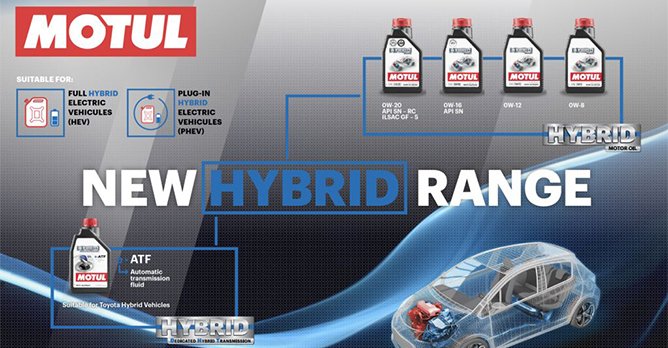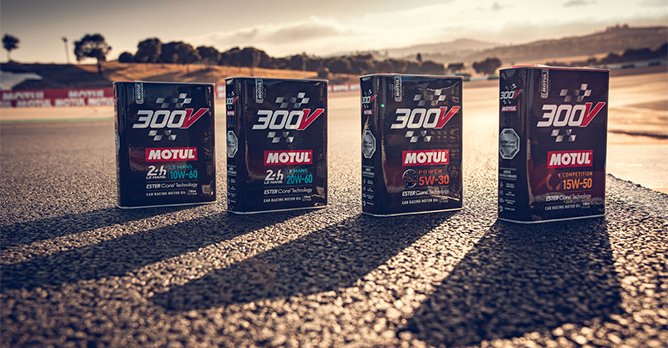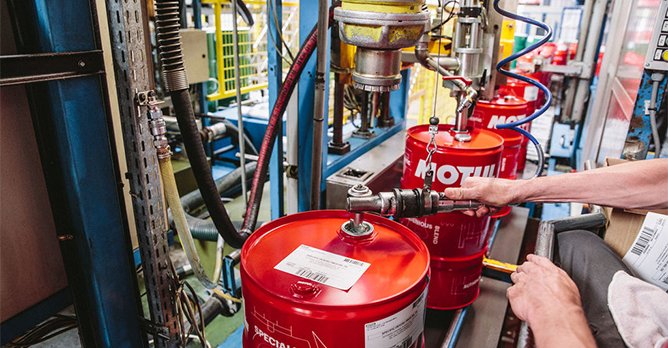The dawn of a greener era: Motul holds steady, while readying itself for change
29 Oct 2021|4,289 views
In all honesty, Motul isn't a name I'd expect the average driver on the street to be acquainted with - at least not nowadays, when the reins of car maintenance and servicing are increasingly handed over to an entire team, hidden behind the plush sofas and scented rooms of service centres.
But it should be.
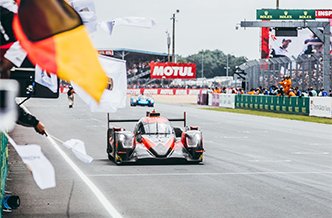 |
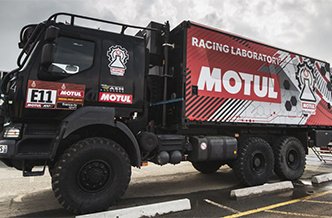 |
Engine oils and lubricants are often overlooked by less hands-on car owners, and unfairly so. They are indispensable parts of what help a car run smoothly, ensuring that the combustion engine - the beating heart of a car - is kept in the pink of health. In the case of revered industry veteran Motul's oils, they even help to push a car's performance beyond its stated limits, with bumps in torque and horsepower.
No wonder then, that Motul is often looked upon as the gold standard for lubricants. Their products run the gamut from high intensity motorsports (like the legendary 24h of Le Mans) - which are often used as a living lab for its R&D team - to performance driving on our very roads.
But as the era of sustainability is nigh, where does this leave Motul? Batteries in electric vehicles negate the need for the lubrication of gears and motors. How does a company, whose flagship product is a high-grade engine oil, proceed in a world where going green is not simply encouraged, but mandated?
Those were the questions I had as I waited in front of my laptop, Zoom window open, to listen to Motul Asia Pacific CEO, Lionel Dantiacq, speak to us about the latest iteration of the company's legendary 300V engine oil, as well as discuss the company's plans for growth and adaptation.
Returning to the roots of the company
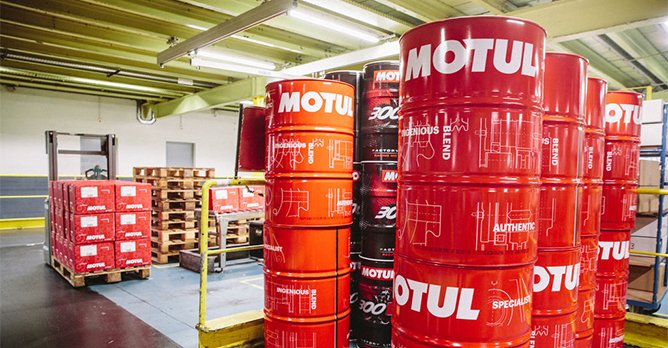
It's important not to forget amidst all the talk about EVs that combustion engines still comprise a very large part of the automotive scene.
As Motul continues to strengthen its presence in Asia, Dantiacq notes that it is crucial for the company to still persist and grow within its existing spheres of operation, since infrastructure will transform at a different pace across different regions.
After all, Motul isn't "a niche brand". One of the company's key goals is to continue its migration towards more middle-range products, even as it remains at the forefront of the high-end, high-performance segment. It is also holding steady on its push into industrial lubricants, which are likely to have a longer runway since manufacturing will always be necessary in one form or another.
Still, this doesn't mean that Motul isn't aware of the impending change. In fact, Dantiacq takes it one step further and asserts that the company is "convinced of the evolution" of the industry.
The French company had already begun embracing the shift with its specifically crafted engine oil for hybrid drivetrains (formulated to cope with the frequency of start-stop in such vehicles). Coolants and driveline fluids will also remain necessary in EVs, and will have to become more sophisticated as EVs proliferate - Motul already produces these, and is in a constant process of R&D to further optimise them for the future.
Nonetheless, a McKinsey report notes that these products will be required in far, far lower volumes than current engine oils and lubricants; where, then does that leave Motul?
Dantiacq reassures that the company is actively observing for new possibilities and market segments - not yet discovered or developed - that will emerge when our roads are eventually awash with electric cars.
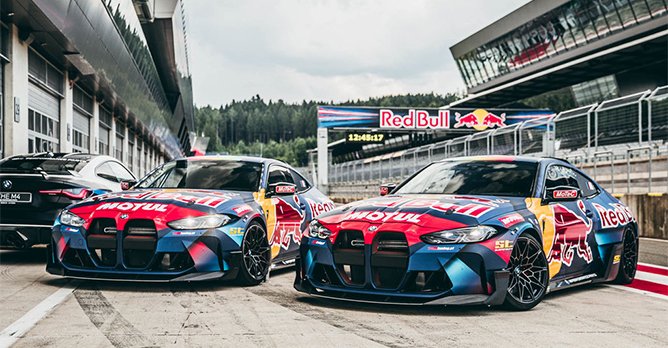
Demonstrating an acute awareness that the EV-industry is still maturing, he points to the company's less tangible strengths that will help anchor its legacy: Its long-standing and invaluable know-how in chemistry, in mobility and in energy.
These are then continually interwoven with its unwavering dedication to innovation, its attentiveness to the needs of its "discerning customers", as well as its long-standing partnerships with the biggest Original Equipment Manufacturer (OEM) names in the industry, altogether forming the heart of its operations.
As new market demands quietly appear, being at the cutting-edge - both on the level of science as well as in terms of relationships established - will provide much needed agility and lucidity for continued success. What could definitely cement Motul's position as an industry leader further is the potential of co-developing products with OEMs. Dantiacq refers to this entire combination of strengths as an ecosystem. "That ecosystem will help us to grab some opportunities to enter some new territories… [even] new domains of activity, such as services."
Not greenwashing
Perhaps most notable is Dantiacq's almost aggressive insistence on the need for Motul to chart a more sustainable path forwards on all fronts. In fact, as we speak, he shares that the company is in the midst of finalising its quantitative environmental targets.
For instance, the latest 300V engine oil - celebrating its 50th anniversary this year - builds on the successes of old by using synthetic, plant-based components as part of its formula. This time round, however, it ups the ante further by reducing the carbon footprint of its manufacturing process by 25% with more organic bases, while still accomplishing the neat trick of boosting engine performance with its Ester Core tech.
Also new this time round is its packaging in a shiny metal tin; one of Motul's most ambitious targets is that of zero plastic. Dantiacq categorically states that the decision was made with consideration too to the company's efforts to streamline its packaging streams, since Motul is also heavily involved in waste management and now, recycling as well. "This is not only for cosmetic and marketing reasons, but really to support the consistency of our sustainability ambitions."
With a keen eye on the entire supply chain, Motul is also making the effort to reduce emissions throughout the entire production process.
Solar energy is being tapped on for its plants in Vietnam, which are aiming to be self-sufficient in power within the next two to three years. Meanwhile, automated tank management systems with smart sensors have been rolled out for distributors in Japan, so that refuelling is only done when necessary (this cuts back on emissions from extra transport and warehousing services).
Dantiacq also shares that Motul is constantly in discussions with its suppliers as to how they can reduce their own carbon footprints by establishing certain codes of conduct. Singapore is part of the process too. "[We're having] a lot of discussions with Enterprise Singapore on recycling, on how we can get better and how we can get more embedded in that very virtuous cycle."
He's also aware of the criticisms that have often accompanied corporate declarations of going green, especially by firms so intimately intertwined with the energy industry. "One day, hopefully, the consumers will recognise as well that Motul is sincere [and] is not greenwashing - this is a real sincerity on all directions on sustainability."
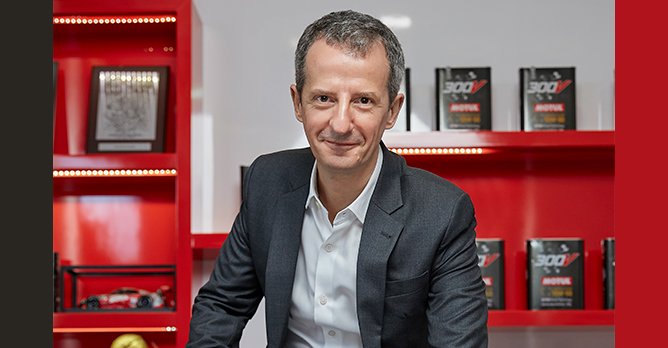
But above all, Dantiacq understands that the green vision will only become reality if he, as the leader, holds on firmly to it so that it remains visible to those under him - something he takes upon himself as "a big responsibility".
When I ask him if he has any personal dreams for Motul, he says with conviction and enthusiasm concomitantly that he strives for his employees - all 850 of them - to also be convinced of the company's green goals. "All our people must know that, and must be proud of being in a company which is fighting everyday, in all manners, for sustainability."
To some extent, Dantiacq appears conscious that there will still be sceptics. But his faith in the company's prospects is unshaken. Motul has been around for 170 years, and will still proceed by embracing change, not fearing it. He hopes that the world will see it - "[this] willingness to continue being here over the next 50 years".
In all honesty, Motul isn't a name I'd expect the average driver on the street to be acquainted with - at least not nowadays, when the reins of car maintenance and servicing are increasingly handed over to an entire team, hidden behind the plush sofas and scented rooms of service centres.
But it should be.
High profile motorsports events, like the 24H Le Mans, are integral to Motul's position at the cutting-edge of the industry
Engine oils and lubricants are often overlooked by less hands-on car owners, and unfairly so. They are indispensable parts of what help a car run smoothly, ensuring that the combustion engine - the beating heart of a car - is kept in the pink of health. In the case of revered industry veteran Motul's oils, they even help to push a car's performance beyond its stated limits, with bumps in torque and horsepower.
No wonder then, that Motul is often looked upon as the gold standard for lubricants. Their products run the gamut from high intensity motorsports (like the legendary 24h of Le Mans) - which are often used as a living lab for its R&D team - to performance driving on our very roads.
But as the era of sustainability is nigh, where does this leave Motul? Batteries in electric vehicles negate the need for the lubrication of gears and motors. How does a company, whose flagship product is a high-grade engine oil, proceed in a world where going green is not simply encouraged, but mandated?
Those were the questions I had as I waited in front of my laptop, Zoom window open, to listen to Motul Asia Pacific CEO, Lionel Dantiacq, speak to us about the latest iteration of the company's legendary 300V engine oil, as well as discuss the company's plans for growth and adaptation.
Returning to the roots of the company

It's important not to forget amidst all the talk about EVs that combustion engines still comprise a very large part of the automotive scene.
As Motul continues to strengthen its presence in Asia, Dantiacq notes that it is crucial for the company to still persist and grow within its existing spheres of operation, since infrastructure will transform at a different pace across different regions.
After all, Motul isn't "a niche brand". One of the company's key goals is to continue its migration towards more middle-range products, even as it remains at the forefront of the high-end, high-performance segment. It is also holding steady on its push into industrial lubricants, which are likely to have a longer runway since manufacturing will always be necessary in one form or another.
Still, this doesn't mean that Motul isn't aware of the impending change. In fact, Dantiacq takes it one step further and asserts that the company is "convinced of the evolution" of the industry.
The French company had already begun embracing the shift with its specifically crafted engine oil for hybrid drivetrains (formulated to cope with the frequency of start-stop in such vehicles). Coolants and driveline fluids will also remain necessary in EVs, and will have to become more sophisticated as EVs proliferate - Motul already produces these, and is in a constant process of R&D to further optimise them for the future.
Nonetheless, a McKinsey report notes that these products will be required in far, far lower volumes than current engine oils and lubricants; where, then does that leave Motul?
Dantiacq reassures that the company is actively observing for new possibilities and market segments - not yet discovered or developed - that will emerge when our roads are eventually awash with electric cars.

Demonstrating an acute awareness that the EV-industry is still maturing, he points to the company's less tangible strengths that will help anchor its legacy: Its long-standing and invaluable know-how in chemistry, in mobility and in energy.
These are then continually interwoven with its unwavering dedication to innovation, its attentiveness to the needs of its "discerning customers", as well as its long-standing partnerships with the biggest Original Equipment Manufacturer (OEM) names in the industry, altogether forming the heart of its operations.
As new market demands quietly appear, being at the cutting-edge - both on the level of science as well as in terms of relationships established - will provide much needed agility and lucidity for continued success. What could definitely cement Motul's position as an industry leader further is the potential of co-developing products with OEMs. Dantiacq refers to this entire combination of strengths as an ecosystem. "That ecosystem will help us to grab some opportunities to enter some new territories… [even] new domains of activity, such as services."
Not greenwashing
Perhaps most notable is Dantiacq's almost aggressive insistence on the need for Motul to chart a more sustainable path forwards on all fronts. In fact, as we speak, he shares that the company is in the midst of finalising its quantitative environmental targets.
For instance, the latest 300V engine oil - celebrating its 50th anniversary this year - builds on the successes of old by using synthetic, plant-based components as part of its formula. This time round, however, it ups the ante further by reducing the carbon footprint of its manufacturing process by 25% with more organic bases, while still accomplishing the neat trick of boosting engine performance with its Ester Core tech.
Also new this time round is its packaging in a shiny metal tin; one of Motul's most ambitious targets is that of zero plastic. Dantiacq categorically states that the decision was made with consideration too to the company's efforts to streamline its packaging streams, since Motul is also heavily involved in waste management and now, recycling as well. "This is not only for cosmetic and marketing reasons, but really to support the consistency of our sustainability ambitions."
With a keen eye on the entire supply chain, Motul is also making the effort to reduce emissions throughout the entire production process.
Solar energy is being tapped on for its plants in Vietnam, which are aiming to be self-sufficient in power within the next two to three years. Meanwhile, automated tank management systems with smart sensors have been rolled out for distributors in Japan, so that refuelling is only done when necessary (this cuts back on emissions from extra transport and warehousing services).
Dantiacq also shares that Motul is constantly in discussions with its suppliers as to how they can reduce their own carbon footprints by establishing certain codes of conduct. Singapore is part of the process too. "[We're having] a lot of discussions with Enterprise Singapore on recycling, on how we can get better and how we can get more embedded in that very virtuous cycle."
He's also aware of the criticisms that have often accompanied corporate declarations of going green, especially by firms so intimately intertwined with the energy industry. "One day, hopefully, the consumers will recognise as well that Motul is sincere [and] is not greenwashing - this is a real sincerity on all directions on sustainability."

But above all, Dantiacq understands that the green vision will only become reality if he, as the leader, holds on firmly to it so that it remains visible to those under him - something he takes upon himself as "a big responsibility".
When I ask him if he has any personal dreams for Motul, he says with conviction and enthusiasm concomitantly that he strives for his employees - all 850 of them - to also be convinced of the company's green goals. "All our people must know that, and must be proud of being in a company which is fighting everyday, in all manners, for sustainability."
To some extent, Dantiacq appears conscious that there will still be sceptics. But his faith in the company's prospects is unshaken. Motul has been around for 170 years, and will still proceed by embracing change, not fearing it. He hopes that the world will see it - "[this] willingness to continue being here over the next 50 years".
Thank You For Your Subscription.









